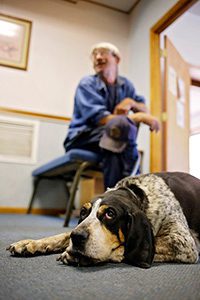
The oil boomtown of Williston, N.D., struggles as low prices cool the demand for oil production.
The Salvation Army in Williston, N.D., increased its food, clothing, and transportation services from roughly 700 people in 2008 to 8,000 people in 2014—a nearly 1,150 percent gain since the oil boom began.
Recently, the nonprofit has become even busier due to the recent downturn in North Dakota’s oil industry. When prices began to skid last fall, North Dakota sustained production levels hoping for a rebound. But since January, that has changed as oil prices have continued to decline. And suddenly, people are losing their jobs and need The Salvation Army’s help.
This is on top of the population the Williston Salvation Army already serves: those who travel from across the country—some on foot—to seek their fortune. Some show up having spent their last dime on a one-way ticket to the oil epicenter; when they don’t find work, they become stranded and homeless. Others find work, but can’t find a place to live other than a tent or their car. Still others are lifelong Williston residents, struggling with the ever-skyrocketing cost of living.
Now, amid the downturn, there is a new group of people in need of assistance. “They came here and got that good-paying oil job, but now they’ve been laid off—suddenly, within 24 hours, they’ve lost their job and their home,” said Captain Joshua Stansbury, who’s led the Williston Salvation Army with his wife, Captain Rhegan Stansbury, since 2011. “Another common scenario happens when housing doesn’t accompany a job. People laid off from a good-paying job are locked into an apartment lease for X amount of months, with no way to pay.”
Although the Williston Salvation Army is not financially equipped to pay a month of somebody’s rent—a $2,200 average, with new construction projects popping up everywhere—the organization is helping in other ways.
A man named Les provides a good example. He came to Williston from North Carolina in 2010 and spent five years in the oil fields, only to be laid off about six months ago.
“We were homeless there for a while,” he said. “First time I’ve been homeless.”
He’s still looking for full-time employment. Meanwhile, he’s been doing side jobs—house painting, plumbing, yard work—through the network of people he’s met during the past half-decade.
He moved into an apartment in June and is earning barely enough money to pay rent. The Salvation Army is helping fill the gaps by providing him food baskets and gas vouchers once a month, along with as much bread as Les needs, as supplies allow.
“The Salvation Army has been very helpful,” he said.
If Les becomes homeless again, the Army’s transportation assistance program could provide him a one-way ticket to North Carolina, or wherever else he may have a support system in place. At the height of the oil boom, the Williston Salvation Army sometimes spent $8,000 or more per month on bus tickets.
The Williston Salvation Army has been using the region’s uncertainties to its advantage by finding and creating new opportunities to serve people in need.
In February 2014, for example, the Williston Salvation Army and New Hope Wesleyan Church created a new cold weather transitional shelter called Project Heat. The program operates daily from late fall to early spring, when up to 10 homeless men can sleep in the warmth of a modular home leased from a local housing company.
Until Project Heat arrived, the Williston homeless population had no shelter options.
“We are proud of what we’ve accomplished so far,” Stansbury said. “We realize there are more than 10 homeless people in Williston, but that’s 10 fewer people who will have to sleep outside when it’s below zero.”
From salvationarmynorth.org












